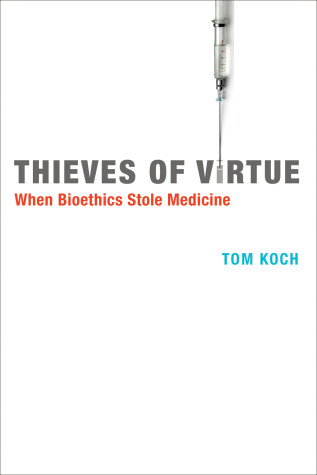Basic Bioethics
2 total works
In Ethics in Everyday Places, ethicist and geographer Tom Koch considers what happens when, as he puts it, “you do everything right but know you've done something wrong." The resulting moral stress and injury, he argues, are pervasive in modern Western society. Koch makes his argument "from the ground up," from the perspective of average persons, and through a revealing series of maps in which issues of ethics and morality are embedded.
The book begins with a general grounding in both moral stress and mapping as a means of investigation. The author then examines the ethical dilemmas of mapmakers and others in the popular media and the sciences, including graphic artists, journalists, researchers, and social scientists. Koch expands from the particular to the general, from mapmaker and journalist to the readers of maps and news. He explores the moral stress and injury in educational funding, poverty, and income inequality ("Why aren't we angry that one in eight fellow citizens lives in federally certified poverty?"), transportation modeling (seen in the iconic map of the London transit system and the hidden realities of exclusion), and U.S. graft organ transplantation.
This uniquely interdisciplinary work rewrites our understanding of the nature of moral stress, distress and injury, and ethics in modern life. Written accessibly and engagingly, it transforms how we think of ethics—personal and professional—amid the often conflicting moral injunctions across modern society.
Copublished with Esri Press
Bioethics emerged in the 1960s from a conviction that physicians and researchers needed the guidance of philosophers in handling the issues raised by technological advances in medicine. It blossomed as a response to the perceived doctor-knows-best paternalism of the traditional medical ethic and today plays a critical role in health policies and treatment decisions. Bioethics claimed to offer a set of generally applicable, universally accepted guidelines that would simplify complex situations. In Thieves of Virtue, Tom Koch contends that bioethics has failed to deliver on its promises. Instead, he argues, bioethics has promoted a view of medicine as a commodity whose delivery is predicated not on care but on economic efficiency.
At the heart of bioethics, Koch writes, is a “lifeboat ethic” that assumes “scarcity” of medical resources is a natural condition rather than the result of prior economic, political, and social choices. The idea of natural scarcity requiring ethical triage signaled a shift in ethical emphasis from patient care and the physician's responsibility for it to neoliberal accountancies and the promotion of research as the preeminent good.
The solution to the failure of bioethics is not a new set of simplistic principles. Koch points the way to a transformed medical ethics that is humanist, responsible, and defensible.

